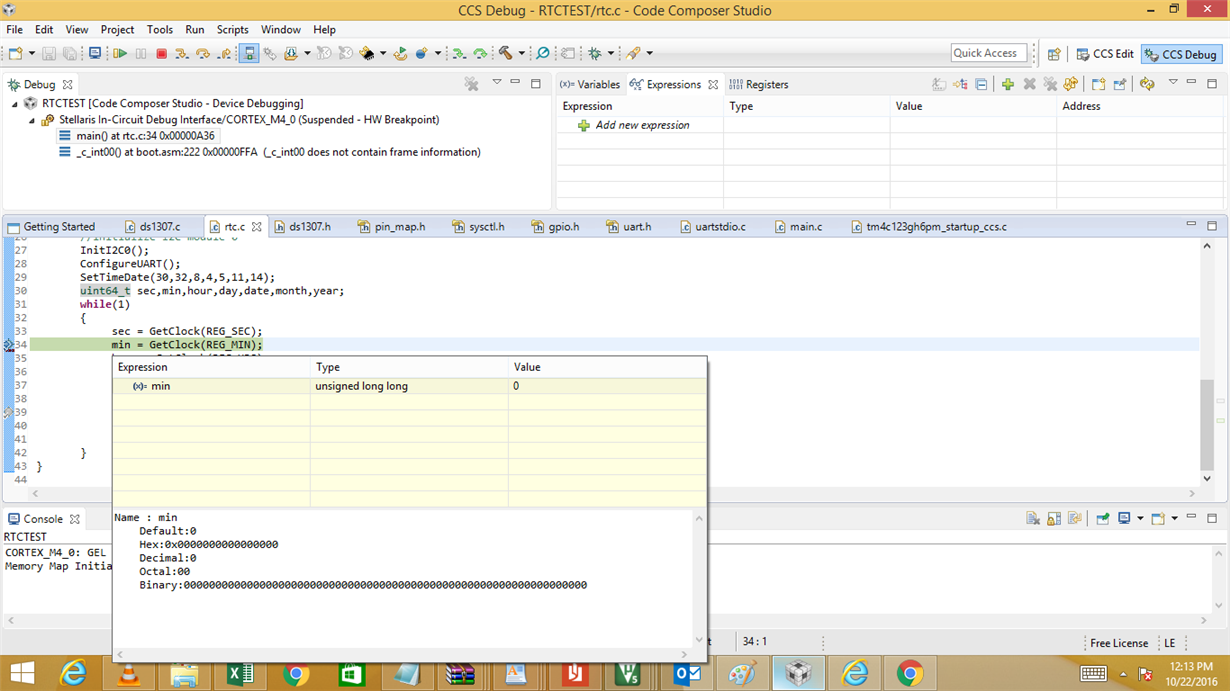/*
* ds1307.c
*/
//INCLUDES
#include <stdarg.h>
#include <stdbool.h>
#include <stdint.h>
#include "inc/hw_i2c.h"
#include "inc/hw_memmap.h"
#include "inc/hw_types.h"
#include "inc/hw_gpio.h"
#include "driverlib/i2c.h"
#include "driverlib/sysctl.h"
#include "driverlib/gpio.h"
#include "driverlib/pin_map.h"
#include "driverlib/uart.h"
#include "uartstdio.h"
#include "ds1307.h"
//initialize I2C module 0
//Slightly modified version of TI's example code
void InitI2C0(void)
{
//enable I2C module 0
SysCtlPeripheralEnable(SYSCTL_PERIPH_I2C0);
//reset module
SysCtlPeripheralReset(SYSCTL_PERIPH_I2C0);
//enable GPIO peripheral that contains I2C 0
SysCtlPeripheralEnable(SYSCTL_PERIPH_GPIOB);
// Configure the pin muxing for I2C0 functions on port B2 and B3.
GPIOPinConfigure(GPIO_PB2_I2C0SCL);
GPIOPinConfigure(GPIO_PB3_I2C0SDA);
GPIOPadConfigSet(GPIO_PORTB_BASE, GPIO_PIN_2, GPIO_STRENGTH_2MA, GPIO_PIN_TYPE_OD);
GPIOPadConfigSet(GPIO_PORTB_BASE, GPIO_PIN_3, GPIO_STRENGTH_2MA, GPIO_PIN_TYPE_OD);
//GPIODirModeSet(GPIO_PORTB_BASE, GPIO_PIN_2, GPIO_DIR_MODE_HW);
//GPIODirModeSet(GPIO_PORTB_BASE, GPIO_PIN_3, GPIO_DIR_MODE_HW);
// Select the I2C function for these pins.
GPIOPinTypeI2CSCL(GPIO_PORTB_BASE, GPIO_PIN_2);
GPIOPinTypeI2C(GPIO_PORTB_BASE, GPIO_PIN_3);
// Enable and initialize the I2C0 master module. Use the system clock for
// the I2C0 module. The last parameter sets the I2C data transfer rate.
// If false the data rate is set to 100kbps and if true the data rate will
// be set to 400kbps.
I2CMasterInitExpClk(I2C0_BASE, SysCtlClockGet(), false);
//clear I2C FIFOs
//HWREG(I2C0_BASE + I2C_O_FIFOCTL) = 80008000;
}
//sends an I2C command to the specified slave
void I2CSend(uint8_t slave_addr, uint8_t num_of_args, ...)
{
// Tell the master module what address it will place on the bus when
// communicating with the slave.
I2CMasterSlaveAddrSet(I2C0_BASE, slave_addr, false);
//stores list of variable number of arguments
va_list vargs;
//specifies the va_list to "open" and the last fixed argument
//so vargs knows where to start looking
va_start(vargs, num_of_args);
//put data to be sent into FIFO
I2CMasterDataPut(I2C0_BASE, va_arg(vargs, uint32_t));
//if there is only one argument, we only need to use the
//single send I2C function
if(num_of_args == 1)
{
//Initiate send of data from the MCU
I2CMasterControl(I2C0_BASE, I2C_MASTER_CMD_SINGLE_SEND);
// Wait until MCU is done transferring.
while(I2CMasterBusy(I2C0_BASE));
//"close" variable argument list
va_end(vargs);
}
//otherwise, we start transmission of multiple bytes on the
//I2C bus
else
{
//Initiate send of data from the MCU
I2CMasterControl(I2C0_BASE, I2C_MASTER_CMD_BURST_SEND_START);
// Wait until MCU is done transferring.
while(I2CMasterBusy(I2C0_BASE));
//send num_of_args-2 pieces of data, using the
//BURST_SEND_CONT command of the I2C module
unsigned char i;
for(i = 1; i < (num_of_args - 1); i++)
{
//put next piece of data into I2C FIFO
I2CMasterDataPut(I2C0_BASE, va_arg(vargs, uint32_t));
//send next data that was just placed into FIFO
I2CMasterControl(I2C0_BASE, I2C_MASTER_CMD_BURST_SEND_CONT);
// Wait until MCU is done transferring.
while(I2CMasterBusy(I2C0_BASE));
}
//put last piece of data into I2C FIFO
I2CMasterDataPut(I2C0_BASE, va_arg(vargs, uint32_t));
//send next data that was just placed into FIFO
I2CMasterControl(I2C0_BASE, I2C_MASTER_CMD_BURST_SEND_FINISH);
// Wait until MCU is done transferring.
while(I2CMasterBusy(I2C0_BASE));
//"close" variable args list
va_end(vargs);
}
}
//read specified register on slave device
uint32_t I2CReceive(uint32_t slave_addr, uint8_t reg)
{
//specify that we are writing (a register address) to the
//slave device
I2CMasterSlaveAddrSet(I2C0_BASE, slave_addr, false);
//specify register to be read
I2CMasterDataPut(I2C0_BASE, reg);
//send control byte and register address byte to slave device
I2CMasterControl(I2C0_BASE, I2C_MASTER_CMD_BURST_SEND_START);
//wait for MCU to finish transaction
while(I2CMasterBusy(I2C0_BASE));
//specify that we are going to read from slave device
I2CMasterSlaveAddrSet(I2C0_BASE, slave_addr, true);
//send control byte and read from the register we
//specified
I2CMasterControl(I2C0_BASE, I2C_MASTER_CMD_SINGLE_RECEIVE);
//wait for MCU to finish transaction
while(I2CMasterBusy(I2C0_BASE));
//return data pulled from the specified register
return I2CMasterDataGet(I2C0_BASE);
}
unsigned char dec2bcd(unsigned char val)
{
return (((val / 10) << 4) | (val % 10));
}
// convert BCD to binary
unsigned char bcd2dec(unsigned char val)
{
return (((val & 0xF0) >> 4) * 10) + (val & 0x0F);
}
//Set Time
void SetTimeDate(unsigned char sec, unsigned char min, unsigned char hour,unsigned char day, unsigned char date, unsigned char month,unsigned char year)
{
I2CSend(I2C_ADDR,8,REG_SEC,dec2bcd(sec),REG_MIN,dec2bcd(min),REG_HRS,dec2bcd(hour),REG_DAY,dec2bcd(day),REG_DATE,dec2bcd(date),REG_MONTH,dec2bcd(month),REG_YEAR,dec2bcd(year));
}
/*/Set Date
void SetDate(unsigned char day, unsigned char date, unsigned char month,unsigned char year)
{
I2CSend(SLAVE_ADDRESS,9,0x00,DAY,dec2bcd(day),DATE,dec2bcd(date),MONTH,dec2bcd(month),YEAR,dec2bcd(year));
}*/
//Get Time and Date
unsigned char GetClock(unsigned char reg)
{
unsigned char clockData = I2CReceive(I2C_ADDR,reg);
return bcd2dec(clockData);
}
void ConfigureUART(void)
{
//
// Enable the GPIO Peripheral used by the UART.
//
SysCtlPeripheralEnable(SYSCTL_PERIPH_GPIOB);
//
// Enable UART0
//
SysCtlPeripheralEnable(SYSCTL_PERIPH_UART1);
//
// Configure GPIO Pins for UART mode.
//
GPIOPinConfigure(GPIO_PB0_U1RX);
GPIOPinConfigure(GPIO_PB1_U1TX);
GPIOPinTypeUART(GPIO_PORTB_BASE, GPIO_PIN_0 | GPIO_PIN_1);
//
// Use the internal 16MHz oscillator as the UART clock source.
//
UARTClockSourceSet(UART1_BASE, UART_CLOCK_PIOSC);
//
// Initialize the UART for console I/O.
//
UARTStdioConfig(0, 115200, 16000000);
}
/*
* rtc.c
*
* Created on: Oct 21, 2016
* Author: User
*/
#include <stdint.h>
#include <stdbool.h>
#include "inc/hw_i2c.h"
#include "inc/hw_memmap.h"
#include "inc/hw_types.h"
#include "inc/hw_gpio.h"
#include "driverlib/i2c.h"
#include "driverlib/sysctl.h"
#include "driverlib/gpio.h"
#include "driverlib/pin_map.h"
#include "driverlib/uart.h"
#include "uartstdio.h"
#include "ds1307.h"
void main(void)
{
// Set the clocking to run directly from the external crystal/oscillator.
SysCtlClockSet(SYSCTL_SYSDIV_4 | SYSCTL_USE_PLL | SYSCTL_OSC_INT | SYSCTL_XTAL_16MHZ);
//initialize I2C module 0
InitI2C0();
ConfigureUART();
SetTimeDate(30,32,8,4,5,11,14);
uint64_t sec,min,hour,day,date,month,year;
while(1)
{
sec = GetClock(REG_SEC);
min = GetClock(REG_MIN);
hour = GetClock(REG_HRS);
day = GetClock(REG_DAY);
date = GetClock(REG_DATE);
month = GetClock(REG_MONTH);
year = GetClock(REG_YEAR);
SysCtlDelay(SysCtlClockGet()/10*3);
UARTprintf("%02d:%02d:%02d \n%02d %02d/%02d/%02d\n",hour,min,sec,day,date,month,year);
}
}
/*
* ds1307.h
*
* Created on: Oct 21, 2016
* Author: User
*/
#ifndef DS1307_H_
#define DS1307_H_
//Defines for DS1307
#define I2C_ADDR 0x68
#define REG_SEC 0x00
#define REG_MIN 0x01
#define REG_HRS 0x02
#define REG_DAY 0x03
#define REG_DATE 0x04
#define REG_MONTH 0x05
#define REG_YEAR 0x06
#define REG_CNTRL 0x07
void InitI2C0(void);
void I2CSend(uint8_t slave_addr, uint8_t num_of_args, ...);
uint32_t I2CReceive(uint32_t slave_addr, uint8_t reg);
unsigned char dec2bcd(unsigned char val);
unsigned char bcd2dec(unsigned char val);
void SetTimeDate(unsigned char sec, unsigned char min, unsigned char hour,unsigned char day, unsigned char date, unsigned char month,unsigned char year);
unsigned char GetClock(unsigned char reg);
void ConfigureUART(void);
#endif /* DS1307_H_ */
I am facing the problem given in the picture. No value appears on the console.


